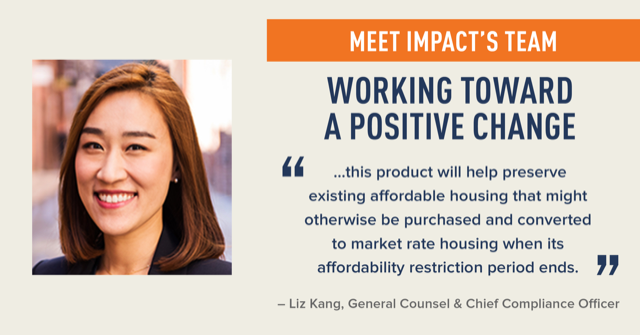Awareness of responsible investing and affordable housing didn’t arrive as an epiphany for me – it occurred over time as I progressed in my career and in my life.
Following law school, I joined a Wall Street law firm where I worked on capital markets transactions, ranging from credit financing to securitizations. In my years studying law, I yearned to learn more about money and the role that financial institutions and regulators play in the capital markets. So I was excited to work on the artfully crafted legal structures and carefully worded documents that go into large corporate deals. Within the first few months of my fledgling legal career, the financial crisis hit and I started to see how powerful capital can be in helping industries flourish but also how harmful it can be when capital is allocated based singularly on profits. The collective alignment of self-interest across numerous participants in the markets ultimately made Main Street Americans bear the brunt of the economic pain in the Great Recession and its aftermath. Today, in the middle of an unprecedented global pandemic, we once again see how crises, of almost any kind, disproportionately impact low income and minority populations.
My path to working in impact investing had some detours along the way. I spent time at two startups, where I quickly realized that the culture and values were not aligned with my own. This forced me to think hard about what I wanted to achieve in my career and if there was an opportunity to help communities while continuing to practice law. At the time, I also started to get more involved with the Korean American Bar Association of Northern California (KABANC) by serving on the board of directors. I saw the needs and challenges that minority communities have and met many wonderful people in grassroots organizations that voluntarily take on the work to try to help. Whether it was as simple as translating a document or fundraising for scholarships and grants, my work at KABANC mattered and had an impact on underserved communities, minority lawyers and law students. This inspired me to search for similar changes in my career where I could be more fulfilled with the purpose of my work.
A Catalyst for Curiosity

The opportunity to do more meaningful work struck when I heard about IMPACT looking for a counsel with experience in debt capital markets and securities law compliance. It was a pleasant surprise to discover that IMPACT had been delivering capital to build housing, childcare and healthcare facilities in underserved communities for over 20 years. The investment vehicles used by IMPACT were familiar to me, but that the capital was going towards helping underserved communities was entirely new and deeply appealing. I did everything I could to get a seat at the table, and I joined IMPACT in 2019 as General Counsel. My days are a mix of negotiating deal documents, RIA compliance review, communications with board members, and advising on employment, privacy and other regulatory issues. I am learning new areas of the law, such as the complex web of federal and local housing regulations and policy that provides subsidies and tax credits for building affordable housing. Lately, I have spent an increasing amount of time on implementing tenant eviction protections and forbearances under the newly enacted Coronavirus Aid, Relief, and Economic Security (CARES) Act, as well as a slew of other COVID-19 related employment and risk management policies. While my work as a lawyer isn’t a massive departure from what I was doing before, our objective of reducing the social equity gap is remarkably different. Because of this mission, I am more satisfied after a deal closing since I know the funds will go into building infrastructure for communities that need it most.
The author Tara Westover in her memoir, “Educated,” has written extensively about the struggles of poverty. Several of her observations resonate when I think about the role of affordable housing. For instance, she noted that the most powerful advantage of having adequate financial resources isn’t necessarily what you can buy, but just the freedom “to think of things besides money.” Citing her own experience, she has remarked in the past that “curiosity is a luxury for the financially secure.” Affordable housing is just one component, but it is foundational for the stability that allows people to focus on their studies, pursue goals, and work towards a better future. My colleague, Paul Hwang, recently wrote about the growing housing affordability crisis, and most are surprised to learn how many and to what extent people are cost burdened – even after the last ten-plus years of continuous growth in the U.S. economy.
IMPACT is also developing a short-term loan product with the intention of driving capital to upgrade and preserve much needed affordable housing.* While I have dealt with loan documents throughout my career, the thing that gets me excited is that this product will help preserve existing affordable housing that might otherwise be purchased and converted to market rate housing after its affordability restriction period. Our program will let a family stay in the home they know and foster a sense of stability. And to me, being part of the finance industry that positively affects people’s lives is what makes IMPACT special. I am proud of what I do and look forward to the day when investing with consideration for making a difference becomes the norm.
*Nothing herein shall constitute an offer to sell, or solicitation of an offer to purchase, any security.
Liz Kang joined IMPACT Community Capital as General Counsel and Chief Compliance Officer in 2019 and is in charge of the development and execution of all legal affairs of IMPACT. Liz focuses on maintaining regulatory compliance of IMPACT Investment Adviser LLC, an SEC-registered investment adviser wholly-owned by IMPACT and managing corporate governance best practices of all IMPACT affiliates and subsidiaries. Liz also oversees transactions related to the CIL Origination Program, investment funds and securitizations managed by IMPACT.
